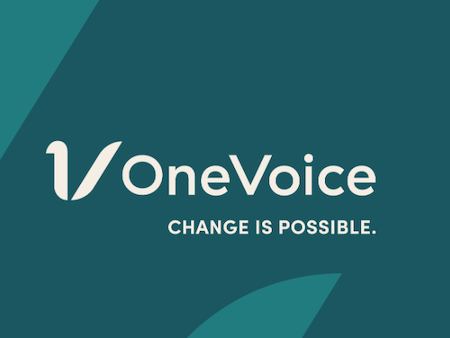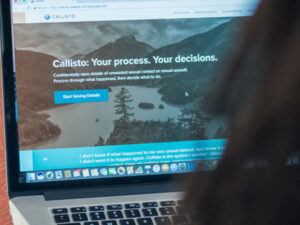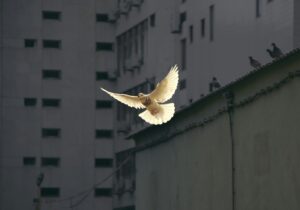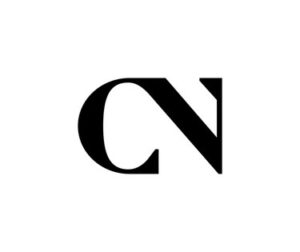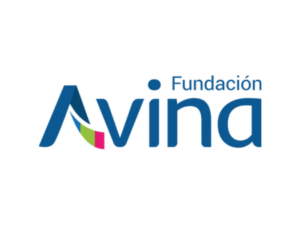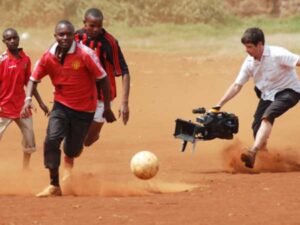The OneVoice Movement supports grassroots activists in Palestine and Israel who are working to build the human capacity to create the necessary conditions for a just and negotiated resolution to the Israeli–Palestinian conflict.
Mara Lee Durrell of OneVoice Movement spoke with Ambika Samarthya-Howard on November 2, 2023. Click here to read the full conversation with insights highlighted.
Ambika Samarthya-Howard: Could you please start by introducing yourself and the problem that your organization was addressing? I’m specifically interested in whether you consider yourself a direct service organization or not a direct service organization?
Mara Lee Durrell: I’m Mara Lee Durrell and I’m the outgoing CEO of the Peaceworks Foundation and the OneVoice Movement, where I’ve been for just under a decade. It’s an organization that has seen enormous shifts. And so your question of whether it’s direct service or indirect, I would say we’ve made a huge evolution, a huge switch from one to the other.
It was founded 20 years ago, primarily in a cycle of violence, in the midst of the second Intifada, basically in recognition in times of violence and high conflict that moderates go quiet. And so it creates a vacuum for further extremism and for further polarization because people are so scared to say the wrong thing, they’re scared to speak up. What happens is that majority opinions feel like they’re minority opinions, and of course, politicians will take advantage of that and, obviously, in many cases, hijack the political agenda for their own narrow views as opposed to putting forward things like a unity government and/or other solutions that would be more broad-based and that would support the majority of their constituents.
Working both in the Israeli and Palestinian societies over the last 20 years, one of the things the organization realized with a lot of introspection was that just the nature of being part of a shared organization and an international organization meant that there was skepticism locally, that the agenda was being driven by an international organization versus being driven locally. And our goal and our intention was always to support local change makers on the ground.
One of the things we had to do was totally restructure and change the entire way that we worked so that there would be authentic local leadership on the ground that was also perceived as authentic local leadership on the ground, making decisions that were right for their stakeholders, their contexts, using language that would resonate with their publics in order to really drive public opinion. And so we’ve moved from a very US, New-York-based organization structurally into a very local organization. That means that the United States organization is now primarily doing grant making, fundraising, awareness building, and then in some cases, advocacy work in the US and UK on their behalf. But the gravity has really changed so that the local change makers are in charge, which, again, is a strategic decision, but we had to make the structural changes in order to make that happen.
Ambika Samarthya-Howard: I feel like what you’re trying to do is really clear. Can you talk more about, especially now, even in the last couple weeks, what you guys actually do And how you do it?
Mara Lee Durrell: We support local change makers on the ground, really, and provide direct capital. So it’s giving them direct grants so that they can build capacity, staff up and then run campaigns. They’re the ones who are saying, “We’re trying to create a change of public opinion within our own society.” These majority voices often think they’re a minority, i.e. pro solution. And again, it’s not up to us to dictate the solution, it’s up to them to dictate the decision, including, hopefully, eventually around a negotiating table.
It’s really providing them everything from thought partnership to models, and tools, and networks in terms of best practices. We will do things like bring in trainers internationally for something. In the case of Palestine, they’re trying to build a Palestinian state. They are trying to build the infrastructure for a state that would represent the majority of its population, be accountable, and be transparent, but when they don’t have those models yet, we’ve done things like partner with universities in Singapore, at the public policy school there. And we brought in people from the UK around public campaigning. So they’re able to learn from other instances within our international network and can then adopt [what they learn] into a local template and make it their own. A lot of that is exposure and training and access in addition to the direct grants.
Ambika Samarthya-Howard: Can you give me an example of a local leader and a campaign that they did? I’m so curious. I would love one through the Palestine-Israel side. What I found really interesting is the way that your messaging was done, it was very clear that you don’t just do conflict resolution. You’re holding space with both these identities, which is different.
Mara Lee Durrell: It is different.
Ambika Samarthya-Howard: And so I was curious if you could talk about a local leader and some of that work in the campaign?
Mara Lee Durrell: It’s a great question. There’s a lot of examples from both national campaigns and hyper-local. One hyper-local initiative that was really powerful came from a volunteer named Mace in Nablus. Nablus is one of the biggest cities within the West Bank, not very well known internationally, but as an old Roman city, it has amazing history, culture, and narrative and it is really important within the Palestinian national narrative.
One of the things that’s very prominent in the Palestinian narrative is land. And that, of course, is their lane to a future Palestinian state, so clear of their identity. But there is not a local awareness in terms of things like trash, and recycling, and respect for the environment, even though there’s such a high place that people look up to the land. So while there’s local stewardship from farmers and shepherds stewarding the land, there’s huge lots that are just filled with trash and there hasn’t been that environmental movement or a local mayor or someone else saying, “Let’s clean this up.”
So one of the volunteers that we’ve supported for a long time and came through a lot of the leadership programs that we’ve supported is this young woman named Mace. She wanted to tie this national identity of respecting the land and stewarding the land to creating something local. So she used her network and the volunteer network that we’ve supported to essentially clean up an entire lot. She lobbied the city and created a local park that has become a real sense of pride for not only the volunteer group that we support there, but for the community. It’s something that was negative that became positive.
But in many ways, that has nothing to do with the occupation. That has nothing to do with international politics. They didn’t need Israel’s approval, which is so rare for Palestinians to be able to do anything and feel like they have political capital. And this is a really concrete way to say, “This is in our hands. We are taking responsibility for doing this. We’re not asking, really, for permission, and we’re going to do something that is in our best interest.” I think this is one example of how people can be seen locally as a local leader because she’s now delivered for her community in a way that many other people have not been able to.
Ambika Samarthya-Howard: Do you do similar stuff on the Israeli side or are they very different issues?
Mara Lee Durrell: Yeah, we, again, work through local partners. So we support them and do a lot of strategic and thought partnership work, but a lot of the campaigns run in Israel are national in scale. A perfect example of this in this moment is, of course, in addition to all of the horrific terrorist attacks against Israelis on October 7th, there was also the massive security breach that allowed that to happen. And so our local partners, Darkenu, are calling for government accountability. The message that you hear from the government right now is, essentially, don’t ask questions. They’re arresting protesters in the street. They’re trying to quash any form of dissent.
While the US narrative of Israel is that it’s a thriving democracy and the only democracy in the Middle East, internally, a very extreme right-wing government is using this moment to quash dissent, to quash democracy, and to essentially take no accountability for the government’s failure to protect Israeli citizens on that horrific day. And so Darkenu is now calling for accountability, doing a public petition, really trying to create the infrastructure for what hopefully will be a public trial so that the public can understand what really happened and to ensure that it doesn’t happen again.
I think that’s an example of where civil society can be at the forefront of really being able to change even the national conversation so that it’s not you’re pro-government or not or pro-Israel or nationalistic or not. You can mourn all of the lives lost and be deeply affected and also be really pissed off at your government and do something productive about it. That gives people agency to do something that I think is really positive.
Ambika Samarthya-Howard: That’s amazing. How do you measure success over time specifically? You’ve given me two examples of things that worked, but how do you know that you’re actually making any progress or how do you find evidence of progress?
Mara Lee Durrell: Yeah, it’s such a good question. I think we realized early on that, when I started about 10 years ago, the metrics that we were looking at were baseline surveys in terms of public opinion for a two-state solution or public opinion for a solution. And the reality is that the news every day would fluctuate so much that it wasn’t actually true of what was politically possible nor was it true of what people wanted. When you dug into the data, it was just whether or not they thought it was possible.
When people looked at the top lines of public opinion polling, we realized it was so shallow in terms of actually giving us insights, in terms of what was possible and where the work needed to be done. So both with our Israeli and Palestinian partners, we’ve actually invested in internal survey data, polling focus, essentially an internal polling solution because, in order to get the right answers, we needed to ask better questions. We needed to be able to understand, for example, in Palestinian society, not just if someone supported Fatah or Hamas, but why did they support Fatah? Why did they support Hamas?
And one of the things we found in this research, even this summer, right before the current escalation that we’re in, is that Fatah and Hamas supporters are much closer in issues. For example, the religiosity score is almost the same. People perceive Hamas as this extreme religious organization, but actually, it’s a very religious and conservative society as a whole. And so if you just look at that, you’re going to assume that people might affiliate with a political party. That’s not true.
If you ask, for example, different questions in terms of what are they looking for in Palestinian leadership, what types of Palestinian leadership would they reward or want to punish, what are the things that would make them vote for specific parties, how much of it is family, tribal, loyalty, local, around vision, how much of it is related to Israel and occupation, how much of it is internal within Palestinian society? And so really getting much better data, much better insights.
For our Palestinian partner, they have now taken this data and can really show, “This is the area in which we need to work.” There are a lot of people, over 50% of Palestinian youth, who don’t affiliate with any of the existing political parties. The local population in the West Bank, the average age is 19. It’s 15 in Gaza. But the average age of a politician is over 70. So they don’t see themselves in politicians. There’s this huge generational gap, there’s this huge ideological gap, and there’s a huge opportunity for new political movements, participation, and action so that we can get better leadership within the Palestinian and the Israeli societies. So that we can start to, hopefully, have better outcomes when there’s governments that respond much better to public opinion locally.
Ambika Samarthya-Howard: I appreciate that you’re actually gathering data around that. Most of this work that we’re doing is really about cross-pollination of insights, specifically about things that didn’t work and what other people could learn from. And that example was great. I was wondering if you had anything else about an important lesson that you’ve learned that other social innovators and system change makers could learn from?
Mara Lee Durrell: I think one of the benefits of now having a little bit of retrospection, I’m working with them as a consultant supporting my successor, but not in the day-to-day, I do think there’s a huge opportunity for collaboration and learning. I think the hard part, of course, for nonprofit leaders is you’re so inundated with the day-to-day and also the local teams on the ground. And so I just don’t think we have the luxury of doing the learning and learning the best practices when you’re in the moment. And so I certainly think about projects like these, and then finding a way for this information to not just get to the CEO or to the board, but get to the entire team. The field director, and the comms director, and the campaign manager are really the people that would benefit so much from other lessons learned and other examples and potentially other contexts.
Ambika Samarthya-Howard: Are you saying that one of your lessons learned is that it’s been really hard to document lessons learned?
Mara Lee Durrell: It’s hard to document and also disseminate within an organization. I think it stays at the top and a CEO can get really inundated with, “Come to this conference, come to this webinar,” and you’re trying to run your organization. You can’t always step away to do that. And I do think there’s a huge opportunity for senior staff within organizations, especially field organizations, to talk to each other.
When we’ve done that, we’ve focused on it in the last three years, and in many ways, actually, I think COVID made it easier because everyone was at home and it was a forced pause. We were able to actually help encourage, but then also find opportunities, for example, for our Palestinian partners to work with other Palestinian organizations. It was also this resource-scarce moment, so we were encouraging and also forcing collaboration in a way that probably people felt too busy to do. And the results have been amazing, just again, finding those best practices, but also areas of collaboration.
We’ve realized, with a lot of organizations that are doing cross-border work, as we call it, with Israelis and Palestinians actually working together on a project, they recruit from the work we do of Israelis and Palestinians because they’re each first working within their own societies to really tackle that. They take a lot of leadership, and then they can come and do cross-border work in a way that has a chance of higher impact in their own society. They’re already networked, they’re already organized. They have pathways to find concrete areas to implement things.
When you come together cross-sector and cross-border, you’re in a position to do things. And so that’s something I’ve been thinking a lot about, is again, how do you also do the day-to-day running of an organization and do the projects and find space and internally reward people to think bigger and work with different NGOs? Certainly, philanthropy and donors are thinking a lot about how they can incentivize that because it’s so hard. Everyone feels like they’re running a mile a minute. And so making that time is certainly something I would love to find ways to do more of.
Ambika Samarthya-Howard: Yeah. And I think maybe that is the answer to my next question, but, obviously, everybody wants more funding. Outside of funding, what specific challenge does your organization face? I’m assuming, obviously, political opposition, conflict, messaging. When you think about your 20 years, externally, what’s been the biggest challenge in pushing a campaign forward?
Mara Lee Durrell: I think this would probably be true for anyone working within the Israeli-Palestinian space and/or conflicts around the world. People see them as intractable. This conflict has been going on now for 50 years, 70 years, 100 years. People can claim longer. And so people don’t see how investments and targeted investment, building capacity on the ground can have long term impact. When they read the news, they think it’s all bad without understanding that, if we don’t play the game, we know what the results are.
In Israel, the folks that we are working with and funding, what is called the moderate majority, they’re trying to essentially create an agenda that could represent all of Israel’s citizens, that would be a democracy and provide rights for everyone who lives there and work toward a peaceful solution with a future Palestinian state. They’re being out funded 10 to one by conservatives in the right, primarily evangelical Christians in America. So the challenge is huge. Some donors can get intimidated by that and they can say, “Well, what’s the point?” And I say, well, again, you either play the game or you don’t. And if you don’t play the game, you know the outcome. So if you want to see an ultra nationalist, ultra religious state-
Ambika Samarthya-Howard: Can you repeat the ratio of the funding one more time?
Mara Lee Durrell: In Israel, essentially, anyone who’s doing political work that is not hard right in Israel is being outfunded 10 to one, primarily by two billionaire philanthropists in America that are politically motivated to do this. We also see a lot of things like, within Israel, they are eroding things like union laws, eroding the social welfare state that was really integral to the country’s founding in 1948. And that’s an American right-wing agenda that is being imported by their donors and essentially being put upon local implementers.
I think there’s so many of us and there’s so many examples where you can just see the internationalization of this, but when it’s being driven by donors and donors’ political agendas that, again, are not representative of the majority opinion, it gets really dangerous. I think it’s important to call that out and to show donors, again, this is the reality, this is the landscape. We’re not asking for another $50,000. We’re asking, if you want to make change, you have to make a real commitment to make this change.
Ambika Samarthya-Howard: Would you consider yourself a systems-level change organization? And if so, what do you do at the systems level?
Mara Lee Durrell: We haven’t focused on systems level. For the last 20 years we’ve been focused on the individual level. A lot of personal transformation work, which is really important in places that have seen conflict for the last 20 years. And then we do community level, and then we’re working on a national level, but I wouldn’t say that we’re at a systems level.
Ambika Samarthya-Howard: In terms of your work, how did it change over the 20 years and how do you see it changing over the next five years?
Mara Lee Durrell: I started based in the Middle East, which I think was really important because I was working in the local offices and, essentially, part international, but working with the local teams. I think field experience cannot be overstated, in terms of how important it is, and hiring internally from people within the field. I always felt really lucky to have that.
When I took the executive director role, we were at this strategic influx of essentially saying, what internal failures could possibly be rethought or removed because the external barriers are so great? We really looked and said, “Okay, there could be shutting down, the organization could be totally changing. What is it that we could possibly do to have a greater impact?” And I give the OneVoice and Peaceworks Foundation founder and board a huge amount of credit because they were willing to have those conversations without ego, without pretense, knowing that they might not like the answer, but that it was so important to be able to essentially look at all the possible options. And in that case, we restructured. We went from this international New York headquartered organization to each country’s organization now being its own independent organization, local board. In Israel, it’s now majority funded by Israelis, which is a huge effort and something we’re really proud of because, again, we needed to find local ownership and local buy-in. People needed skin in the game. It needs to be perceived locally as a local initiative to be credible.
On the international scale, this is where the work really changes where we said, “Okay, we’re not running the organization internationally anymore. We’re doing all the fundraising, we’re doing the capacity building, and we’re doing the support, but it gave us the opportunity to start looking at who is within our network that we could plug into their program, what are their trainings that we might be able to provide, who do we know who could do this for them?
It could’ve been the building capacity pillar, but really building the knowledge, access, and networks that we have never done before. That was something that I think was really valuable, really valued by the teams locally. The organization has seen that each of the individual parts are no stronger than the whole ever was in its prior capacity. So my role changed a lot as we implemented all those changes.
Ambika Samarthya-Howard: What’s next or where do you see this evolving?
Mara Lee Durrell: Honestly, I think October 7th, the attacks changed everything. I don’t think there’ll be a just going back to how things work, which, to be honest, is a really important thing to recognize. It wasn’t peaceful before. It wasn’t a quiet piece. It wasn’t stability. It was occupation and blockades, and millions of people were suffering as a result. Also, Israelis were not safe. So I think there’s the sense that it was calm before and now we’re at war, but I was living in the Middle East in the war of 2014, then you saw the war of 2021. This feels different in many ways.
I think where the international community comes in or not will totally depend. I’m personally very worried with what’s happened with Gaza already. Even if there was a ceasefire tomorrow, the tragedy of 8,500 people being killed in three weeks, 3,500 plus children, is beyond a scale that people couldn’t imagine or grasp and will only further, I think, extremism and hatred and people really having very hard lines. I think individuals can grieve Israelis’ losses and the loss of innocent civilian life, and yet will feel, I think, within the Arab and Muslim world, very hardened against Israel as a military state killing Arab and Muslim innocent Palestinians living in Gaza, who have nothing to do with Hamas. As I’ve said, we’ve done so much research to show they also don’t support Hamas.
I think this will make this work much harder. It will also make it much more important. Again, I think, for the work that OneVoice is doing, by investing in local Palestinian change makers and creating a different space and a different conversation that is being led by Palestinians, that is saying, “This is what we want, this is an agenda that we want, these are our values, this is what we’re working toward,” can become a north star that people can rally around that, again, can be Palestinian-owned and something positive, because otherwise we fall back just into pro-Israel or pro-Palestine, Israel good or bad, Palestine good or bad, Palestinians good or bad. So much will happen, I think, over the next couple weeks.
Ambika Samarthya-Howard: Are you still in touch with the leadership right now of the organization?
Mara Lee Durrell: Yes, I’m still formally consulting with OneVoice. And personally, I’m just taking it upon myself to find ways to be helpful. We have a lot of Israeli staff who have family who are hostages. And so we’ve been setting up meetings in DC and what has, I think, been one of the hardest things to see is that Israelis feel like their only avenue to be heard is to come to the United States to try and influence US foreign policy to then influence Israel to try and tell Israel that a priority is to bring Israelis home. It’s insane.
Ambika Samarthya-Howard: Most of what I’ve been reading about the protests are just people for peace and Israelis trying to bring their families home. And also Israelis that are just like, “We don’t want to be associated with what’s happening at all.”
Mara Lee Durrell: “This is not in our name.”
Ambika Samarthya-Howard: Yes. The backlashes are real.
Mara Lee Durrell: It’s real. So things that are hard for a 501(c)3 to do, for example, is to raise money and send it directly to Palestinians’ bank accounts in Gaza right now. There’s an audit, there’s not a trail. And so that’s something I just started doing myself because I was like, “I can help weave through staff members there.” I raised almost $10,000 directly and I’m just sending it directly to their account. They’re all safe now.
Ambika Samarthya-Howard: Are they in the south right now?
Mara Lee Durrell: One of them was staying in the north. All of the buildings around him were bombed. We were trying to convince him to go to the south and he felt that it wasn’t safe. He has both a mom that has poor health and a grandmother that didn’t feel like they could make the journey. And then of course, Palestinians didn’t trust the safe roads because the Israelis said, “Go on these safe roads and go to the south,” and they bomb some of them again, not militants, total innocents. And so Palestinians then were like, “Is this a trap?”
So even for someone who’s been a professional peacemaker in Gaza and has been interrogated by Hamas a million times, our office was bombed really early, on day three of the war. Our colleague’s house was bombed. She fled barefoot with a bag of clothes. Our other colleague, we had bought him a generator before so that we could even just stay in touch with him because, even before they’d just turn electricity off, they’d have two hours of electricity a day. And here he was, trying to organize Gazans to support non-violence and to support a Palestinian state and to do all this really amazing community building work they’re just phenomenal at.
And so we bought him a generator, so he was literally not using the money to buy fuel for a generator to pump water out of our other colleague’s well. And they were feeding 85 people, a family in his house, and 250 plus people just in his neighborhood. They were giving people water for eight days and then they finally went to the south and their backyard was bombed.
My colleague’s uncle is a doctor at the Doctors Without Borders in Gaza City. And so they’re doing work. I’ll show you some of the pictures. It’s insane. As people are being bombed and people are trying to find people in the rubble, the volunteers that we support in Gaza are out as an organized group, trying to pull people out, providing the families with water and food. And yeah, there’s a real sense of community. People are sharing food. It’s the opposite of what you would think it would be, like the Hunger Games. I think it’s a real testament to Gazan hospitality and their way of life. People don’t know how long they’ll have food for and they’re sharing it. It’s just been amazing. And hardworking. Totally unnecessary. But I don’t know where we go from here because I don’t know how this ends.
Ambika Samarthya-Howard: Yeah, I think that most of us feel like, no matter how this ends, it’s just going to be the start of something else.
Mara Lee Durrell: Yeah, I definitely agree with that.
Ambika Samarthya-Howard: I really appreciate you taking the time to talk with me about this today.
Click here to read the full conversation with insights highlighted.
Ambika Samarthya-Howard (she/her) is SJN’s Chief Innovation Officer: She leads on innovation and technology, leverages communication platforms for the network strategy and creates cool content. She has an MFA from Columbia’s Film School and has been creating, teaching and writing at the intersection of storytelling and social good for two decades. She has produced content for Current TV, UNICEF, Havas, Praekelt.org, UNICEF, UNFPA, Save the Children, FCDO, Global Integrity and Prism.
* This interview has been edited and condensed.
Find other organizations working on peace resolutions.

